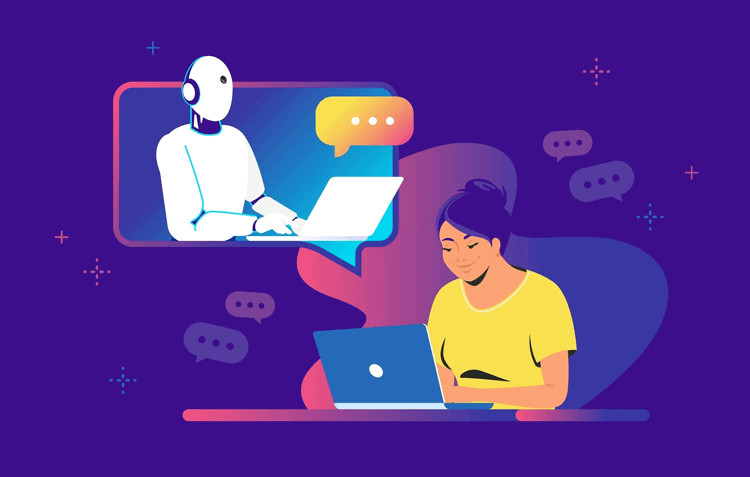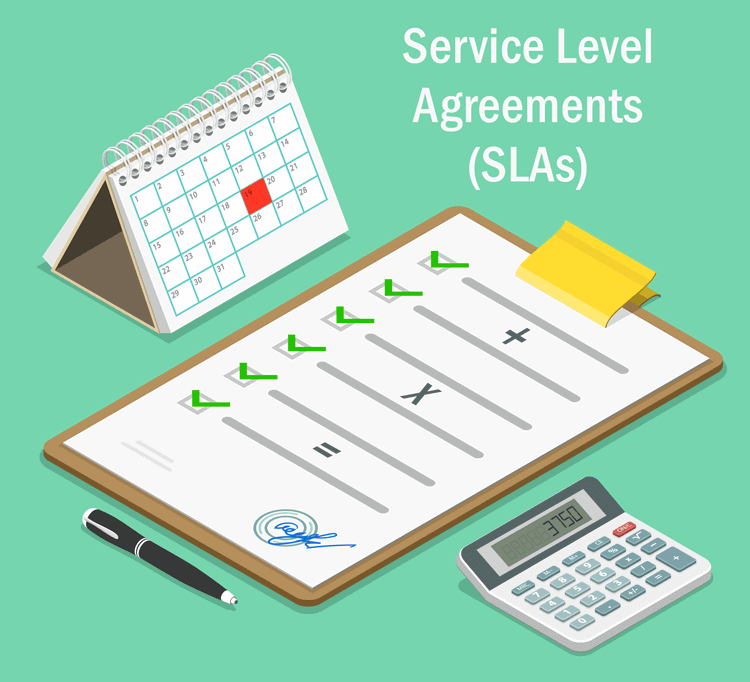How to Use AI for Customer Service: 7 Strategies Plus Advantages for Contact Centers and Help Desks
The use of Artificial Intelligence in customer service is increasing more and more in continued efforts to provide an excellent customer experience. Contact centers and help desks are turning to Artificial Intelligence (AI) to improve efficiencies and delivery with customer service automation.

Businesses that aren't implementing AI are falling behind. According to Accenture: "The introduction of AI could lead to an economic boost of US$14 trillion in additional gross value added (GVA) across 16 industries in 12 economies." AI has the potential to boost "profitability by an average of 38 percent by 2035."
Let's explore how AI is being used in customer service and the advantages of contact centers and help desks embracing AI-powered software (SaaS), chatbots, and generative AI tools.
What is AI?
Artificial Intelligence (AI) is an extensive sector and field of study that covers machine learning (ML), big data, foundation models, deep learning, neural networks, Natural Language Processing (NLP), and many others. One well-known, user-facing implementation is OpenAI's ChatGPT.
More and more, these tools and technologies are being integrated with various types of traditional software platforms, such as customer service software.
What is AI in Customer Service?
AI in customer service involves automating customer support processes and interactions using Artificial Intelligence technologies. Customer support is streamlined by allowing customers ask questions and find help on their own without agent interaction, and repetitive and routine support tasks are automated as well. Further, with AI, customer service agents can respond to questions and issues quickly and accurately in a personalized way. These all can enhance the overall customer experience and thereby increase customer loyalty and satisfaction.
Far too many contact centers are under mounting pressure and overloaded with calls and tickets. For this reason, businesses are increasingly turning to AI to provide a better customer experience. This can also help improve the efficiency of their customer service operations.
For customers of every business, McKinsey has found that high-quality, responsive, helpful customer service "can increase sales revenue by 2-7% and profitability by 1-2%. AI can dramatically improve the quality, accuracy, and responsiveness of service that customers receive.
For example, AI-powered Chatbots can provide customers with 24/7 Live Chat and self-serve support. This takes the pressure off customer service teams. The more accurate and helpful the answers AI bots provide, the fewer calls and tickets contact centers receive.
Then, real-time human support is more readily available for more complex problems that an AI chatbot can't solve.
In customer service, the most widely used AI models are known as Foundation Models and Large Language Models (LLMs). OpenAI's ChatGPT (including Version 4), DALLE-2, and BERT, a Google creation, are examples of these.
Watch Our Video On How to Use AI for Customer Service: Transforming Contact Centers and Help Desks
7 Strategies for How to Use AI in Customer Service
AI in customer service is a versatile, multi-faceted, and functional solution. Here are 7 ways AI is being applied and leveraged in customer service and help desk environments to enhance efficiency and cost-effectiveness.
-
AI Chatbots as a Self-Serve Customer Support Solution
Customer service in every sector is evolving, and AI is playing a major role in this transformation. AI chatbots are increasingly being used to provide customer support, and they offer a range of benefits that are hard to ignore.
AI chatbots can provide 24/7 customer support, eliminating the need for manual customer service agents. This means customers can get their queries answered at any time of the day, which makes service more efficient and customer-focused.
AI chatbots are also able to quickly and accurately answer customer queries, even for increasingly complex problems, thanks to generative AI tool integrations. This ensures that customers receive timely and precise answers to their questions, enhancing their overall experience.
AI chatbots can also help to reduce customer wait times, improving customer satisfaction. They can also help reduce operational customer service costs, benefitting the business' bottom line
-
Categorize Customer Help Desk Tickets
AI sentiment analysis software using NLP and other solutions can help to categorize customer help desk tickets quickly and accurately. This brings process automation and reduces the amount of time spent on manual sorting. AI can also help to identify common patterns and trends in help desk tickets, enabling service agents to anticipate customer needs proactively.
AI can be used to quickly identify tickets that need more urgent attention and prioritize them accordingly. This allows agents to deal with the most pressing issues first, providing a better overall customer experience.
AI can also be used to detect any potential problems with customer help desk tickets and quickly address them rather than waiting for customers to notice and report them. For example, what if a ticket is getting close to the service level agreement (SLA) response time window? AI tools can alert an agent that a ticket has been overlooked and needs urgent attention.
-
Assign Customer Support Tickets
AI can automate the process of assigning customer support tickets, enabling agents to focus on more complex tasks and provide more efficient support. This way, the right ticket goes to the right agent, so if it's a more complex support issue, a higher-level agent receives it.
AI can also be used to analyze customer requests in order to identify trends or common issues and assign tickets to agents with the most expertise to solve them.
In addition, AI can be used to monitor customer queries and provide feedback to agents on how to improve the level of customer service they provide.
-
Generate Self-Serve Troubleshooting and FAQ Content
AI-generated self-service troubleshooting and FAQ content (articles, etc.) enable customers to quickly and easily find answers to their questions.
AI-powered self-service options are also available 24/7, providing customers with an always-on customer service experience. These options can be tailored to the individual customer's needs, giving personalized support.
AI software can be leveraged to analyze support tickets and call transcripts to identify patterns and common questions. It can then produce automated responses that the self-serve team can edit, improve, link to other articles, and publish.
-
Intelligent Routing of Support Tickets
AI can be used to route customer service tickets to the most appropriate team or agent in order to resolve customer issues quickly. AI-powered solutions can analyze customer conversations to identify the nature of the problem and assign tickets to the most suitable team.
Automating tasks such as ticket routing and ticket prioritization, freeing up customer service agents to focus on more complex customer issues, improves the overall customer experience.
-
Analyze Content and Context of Customer Feedback Using Natural Language Processing (NLP)
Another advantage is that AI can provide service agents with valuable insights and can automate repetitive tasks such as ticketing, routing, and customer segmentation.
AI can use NLP to analyze customer feedback and understand the context and content of what customers need help with, such as the most common problems. Have the questions customers are asking changed recently?
Maybe the company has launched a new product or service, and it's causing confusion and problems for customers. An AI NLP-based solution can help understand these challenges and support customer service and customer experience (CX) leaders in coming up with an effective solution.
-
Automate and Collect Customer Satisfaction Scores
AI algorithms can be used to monitor customer interactions, allowing customer service agents to improve their performance. This reduces Average Handling Time (AHT) and First-Call Resolution (FCR) while increasing customer satisfaction and net promoter scores (CSAT & NPS). It also reduces the need for manual or ad-hoc collection of surveys and allows customer service teams to quickly and accurately collect customer feedback.
Once responses come in, AI can also be used to analyze customer feedback and identify any recurring themes or issues that customers are having, allowing customer service teams to address any issues quickly.
AI can also be used to improve customer support by providing agents with real-time data. This data can be used to identify customer service trends and optimize customer service operations.
3 Benefits of AI in Customer Service
As we've seen, AI in customer service is continuing to grow in popularity. Customer service teams can benefit from AI in a variety of ways, including 24/7 support.
-
Automated Manual Tasks, Improving First-Contact Resolution (FCR) Rates
AI can respond quickly to customer queries, providing fast and accurate answers. AI-powered software can also gain a better understanding of customer needs and provide more personalized service.
With automation, AI can free up customer service agents to focus on more complex customer issues, improving FCR and other Key Performance Indicators (KPIs) within the SLA targets.
-
Improved Customer Support Workflows
AI-powered systems can automate and streamline customer service workflows, providing customers with quick and accurate answers to their queries. AI-based customer support systems can identify customer preferences and suggest personalized solutions tailored to their individual needs.
AI-powered customer support systems can monitor client sentiment and offer proactive assistance, making it easier and faster to find and resolve customers' issues.
-
Improved Response and Average Handle Times (AHT)
Another advantage is that AI can reduce customer support response times by automating simple tasks such as answering basic questions, providing product information, or routing customers to the right team. This can reduce the AHT. By using natural language processing, AI-powered chatbots can quickly and accurately interpret customer queries and provide relevant answers.
Key Takeaways: How AI Can Help Customer Service
AI is increasingly being used in customer service to improve effectiveness and the client experience. This technology usually consists of large language models like ChatGPT, generative AI tools, and AI chatbots. It allows support teams to provide round-the-clock support, classify help desk issues and assign them to the appropriate agents, create self-help troubleshooting content, intelligently route tickets, analyze customer comments using Natural Language Processing, and automate customer satisfaction surveys.
In order to improve customer satisfaction and operational effectiveness, AI in customer service can automate manual operations, streamline support workflows, and shorten response times.
If businesses want to stay competitive and offer first-rate support, they should consider incorporating AI into their customer care.
Streamline Your Customer Support with Giva's AI Copilot
Giva is integrating AI solutions with our customer service and help desk SaaS products.
Watch a video demonstration on Giva's AI Copilot capabilities.
Start a free 30-day trial today, or schedule a demo to learn more.








